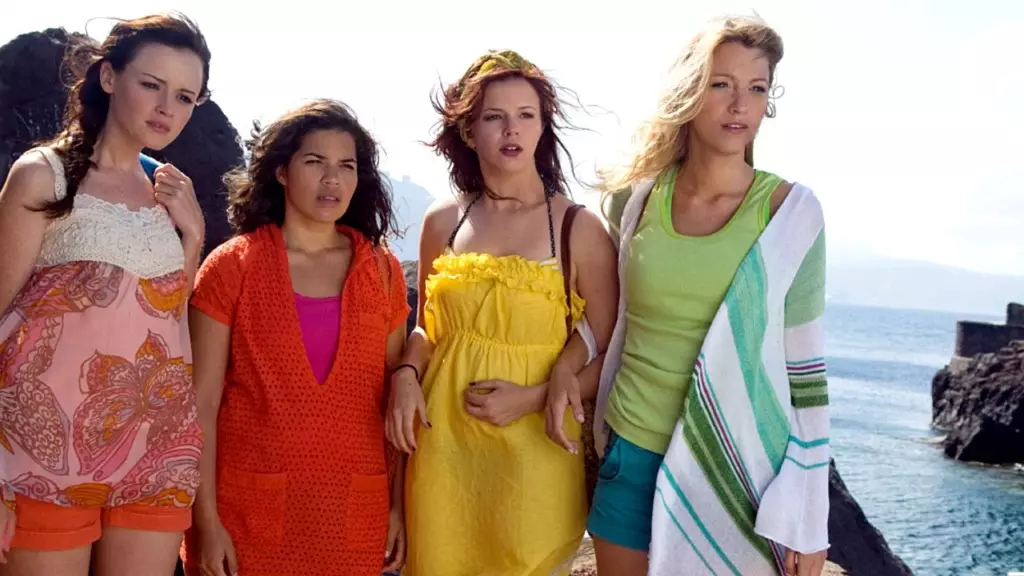In the vibrant landscape of Hollywood, where talent and celebrity often collide, complex relationships and power dynamics can complicate even the most seemingly innocuous collaborations. The recent emergence of Blake Lively’s lawsuit against director Justin Baldoni is a stark reminder of these complexities. Lively’s allegations of sexual harassment and retaliation against Baldoni have ignited a firestorm of support from her co-stars and friends from their earlier collaboration, “The Sisterhood of the Traveling Pants.” America Ferrera, Amber Rose Tamblyn, and Alexis Bledel have penned a heartfelt letter in solidarity with Lively, echoing the friendship and camaraderie portrayed in their beloved 2005 film. Their message not only articulates their unwavering support but also dives into the disturbing realities that often plague women’s experiences in the workplace.
A Voice for the Voiceless
The joint statement released by Ferrera, Tamblyn, and Bledel is powerful in its clarity and conviction. The trio eloquently describes their observations of Lively’s courage as she sought a safe working environment during the production of “It Ends With Us.” Highlighting the hypocrisy of a film that tackles the pressing issue of domestic violence — particularly in light of Baldoni’s self-proclaimed status as a feminist ally — the letter underscores a disheartening reality: even strong and celebrated women can find themselves on the receiving end of hostility for advocating for their rights. This juxtaposition calls into question the authenticity of the feminist discourse surrounding such projects and suggests that deeper institutional changes are still necessary within the industry.
The Disturbing Allegations
The nature of Lively’s allegations is as troubling as it is eye-opening. Her 80-page lawsuit reveals a myriad of disturbing behaviors exhibited by Baldoni, from improvised intimate scenes that disregarded her comfort to inappropriate discussions that crossed personal boundaries. These purported actions form a pattern of behavior that paints a concerning picture of the workplace culture on the film set. If true, Baldoni’s actions reflect a broader issue: the persistent challenges faced by women in navigating spaces where their voices are often marginalized. The implications of her claims, coupled with a reported campaign designed to discredit her, raise significant questions about accountability and support systems in the film industry.
As the tides of public sentiment gradually shift towards greater transparency and accountability across various sectors, Lively’s case exemplifies the kind of reckoning that many in Hollywood are currently facing. With Baldoni’s abrupt loss of representation amid the scandal, it becomes evident that the industry is beginning to react to allegations of misconduct with greater urgency. This shift could signify a turning point, suggesting that victim narratives may no longer be trivialized or brushed aside in favor of protecting the reputations of those in power.
The public support from Lively’s “Sisterhood” co-stars serves to highlight the importance of solidarity among women, especially when confronting injustices. Their statement indicates a profound understanding of the complexities inherent in such experiences. In a world where silence has frequently been the default reaction to harassment and misconduct, public declarations of support not only bolster the accused but also lend courage to others who may be facing similar battles in silence. Such alliances remind us that the challenges faced by women in the industry are not isolated incidents but rather part of a broader struggle for respect and recognition.
As Blake Lively navigates the turbulent waters of her lawsuit against Justin Baldoni, the wider implications of her fight cannot be overstated. This ongoing legal battle is not just a personal struggle for Lively but a rallying cry for systemic change within the entertainment industry and beyond. It urges audiences to reflect on the realities of harassment, the significance of safe work environments, and the pressing need for open dialogues about gender dynamics. As more individuals come forward to share their experiences, the hope is that solidarity will pave the way for a safer, more equitable workplace for everyone.


Leave a Reply